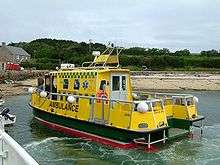Water ambulance
The water ambulance is a boat used for emergency medical care in island areas such as the city of Venice, Italy, the Isles of Scilly, UK or the Norway fjords.

Sweden
Crews on Swedish water ambulances are normally made up of three persons, including a pilot (sailor) and at least one specialist nurse (usually ambulance, intensive care, or emergency care specialisations). The third in the crew can be an undergraduate nurse, or alternatively an ambulance healthcare provider. The medical staff are also trained crew members on the ship.
Gothenburg got its first maritime emergency in 2008 [1]. The vessel covers Gothenburg's southern archipelago, and is based in Öckerö.
Venice water ambulance service

Venetian water ambulances, which are part of the Venetian Emergency Medical Service (Venezia Emergenza), are equipped with advanced life support equipment, such as an automated respirator, a monitor-defibrillator, and pharmaceuticals, amongst other things.
The boat crew is made up of an emergency care nurse, two emergency first level medical care technicians to bring patients on and off board, and a water ambulance pilot. In life-threatening calls, classified as code red, an emergency physician gets on board with the rest of the crew.
Non-emergency patient transport water ambulances are equipped with basic life support equipment and are crewed by two or more volunteers from the Mestre Green Cross or a private company, such as the Blue Cross.
All water ambulances are equipped with blue flashing lights, siren, two way radio and radar. Emergency water ambulances are noticeable by the emergency medical phone number 118 printed on each side.
The National Maritime Ambulance Charity
In 2012 a UK-based organisation called Coast Medic was set up to provide and promote medical aid in coastal waters and shoreline areas. They offer paramedic ambulance cover on a voluntary basis to marine based events through the use of ambulance boats. They also install publicly accessible lifesaving devices called AEDs (Automated external defibrillator) in rural coastal areas.
References
- Cancellation Agreement 2005128-001 between Västra Götaland Region and Falck Ambulans AB